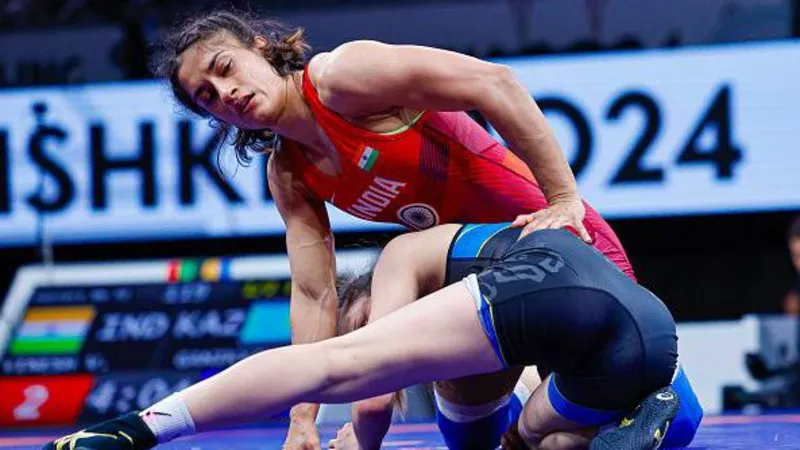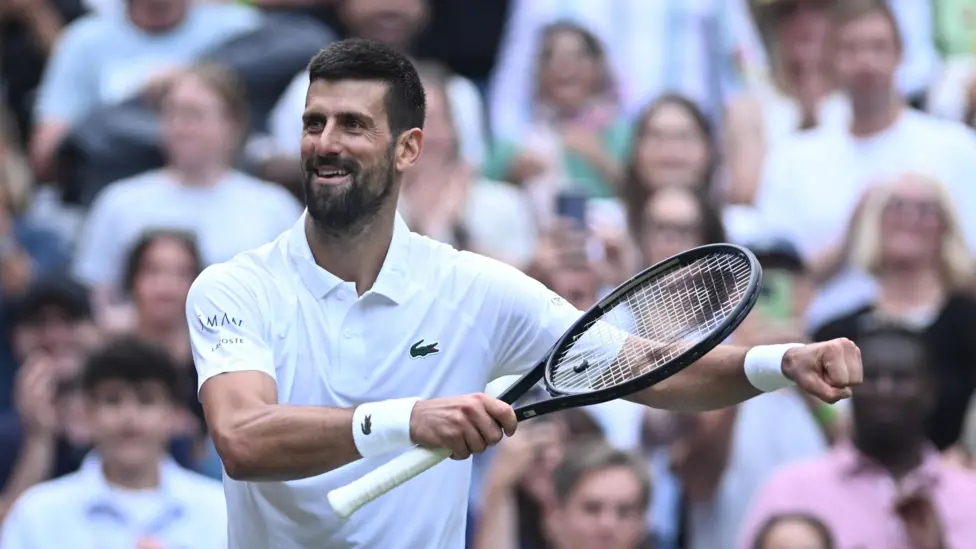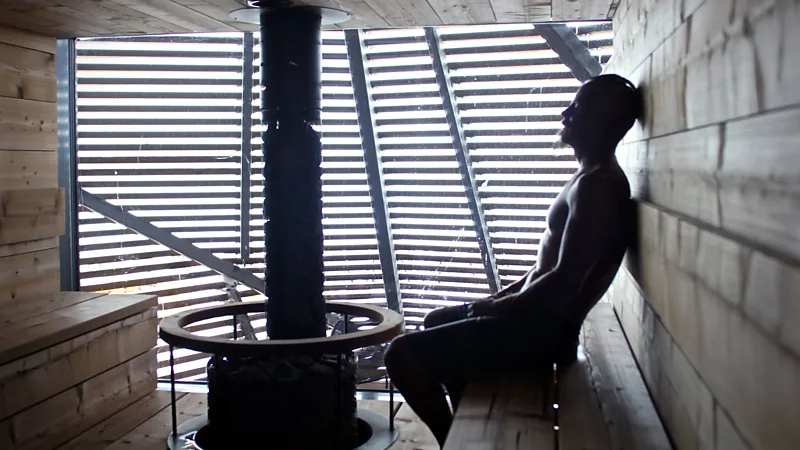Indian wrestlers eye Olympics after sex harassment scandal
Over a year after protests against sexual harassment allegations shook Indian wrestling, female athletes are gearing up for major events, including the 2024 Paris Olympics. The BBC spoke to young wrestlers about their journey.

Reetika Hooda almost didn't make it.
The 23-year-old is among the five Indian women wrestlers to qualify for the Olympics this year.
It’s a hard-won opportunity, following a year of setbacks that shook her confidence. She knew she needed more training and competitions to improve her game.
A year ago, all wrestling came to a halt in India after its federation chief Brij Bhushan Singh was accused of sexual misconduct. He denies the allegations.
India’s sports ministry did not sack Singh but it disbanded the federation after finding several lapses, including the non-compliance of sexual harassment laws, and set up a temporary team to run things.
It was an unprecedented time. Hooda remembers watching the country’s most accomplished wrestlers, including her inspiration Sakshi Malik - the only Indian woman to win an Olympic medal in wrestling - camp on the roads of Delhi, demanding Singh’s resignation.
The protest made headlines globally, especially after the police detained the wrestlers when they tried to march to India's new parliament building. The International Olympic Committee (IOC) condemned the way the wrestlers were treated and called for an impartial inquiry into their complaints.
“It was sad - not only because of what was happening but also what wasn’t,” Hooda told me.
The 2023 protests made global headlines after top athletes were detained
Each year, the International Olympic Committee designates certain tournaments as qualification events for the games. To compete, wrestlers must earn ranking points in trials, win national competitions, and secure the Wrestling Federation of India's (WFI) approval.
But instead of competing, Hooda stared at an empty sporting calendar for weeks.
“We trained but there were no trials, which meant we could not compete and know our shortcomings. There was a constant fear that we won’t be prepared [for the Olympics],” she said.
For a country that’s won only 24 medals at individual events in Olympics, with over a quarter in wrestling, this was worrying.
Fresh elections to the WFI were finally held in December 2023, nearly a year after the protests began.
The wrestlers had asked India's sports minister to prevent people associated with Singh from participating in the election.
Singh did not contest as he had already served the maximum of three terms. But his close aide Sanjay Singh was elected the chief after a landslide victory.
This sparked outrage among women wrestlers. On the same day, Olympic medallist Malik quit the sport in protest.
“Even now I get emotional when I think of that moment,” Malik said. “Wrestling took me to such heights, got me love and respect, and I had to give it up.”
Sakshi Malik won the 58kg freestyle bronze at the 2016 Rio Olympics
Young wrestlers were stunned by Malik’s decision – but soon, they were back on the mat.
“Sakshi Malik was the reason I took up wrestling,” said Tanu Malik, a 20-year-old wrestler in Haryana state.
“So when I saw her crying, I thought to myself, she fought for us, we can’t give up now.”
From that day, Tanu Malik decided to work harder.
Her training at the state’s all-women Yudhvir Wrestling Academy starts at 04:30.
The day starts with a rigorous five-hour fitness session, lifting large truck tyres and practicing wrestling techniques. After a break for food and rest, the women resume training for another five hours in the afternoon.
Girls as young as 12 years sweat it out on the mat. In their free time, they talk about diets and share recipes that would help them stay fit.
None of them want to talk about the alleged sexual harassment at academies or the accusations against the former wrestling chief. However, they are determined not to give up.
Seema Kharab, a coach, says that contrary to expectations, the number of girls at the academy has not dropped since the protests.
“The protests have assured young wrestlers that it is possible to raise their voice, that positive action may be taken and they can get support within the system,” she says.
Reetika Hooda is among the five women wrestlers from India to qualify for the Olympics
In June, the police charged Brij Bhushan Singh with stalking, harassment, intimidation, and making "sexually coloured remarks", but a court granted him bail
Meanwhile, the new federation chief, Sanjay Singh, has taken on the mantle.
He acknowledged his 30-year relationship with the former chief but dismissed allegations of Brij Bhushan Singh's interference, claiming wrestlers had accepted him as the new head.
He said this was evident from the “massive turnout” at national wrestling competitions this year.
“No-one will be favoured or discriminated against and each wrestler is dear to me. I am also the father of two daughters and I understand what daughters need,” he added.
However, for young women like Tanu Malik, fear has become an inescapable part of being in the profession.
“It’s not easy - my parents are constantly worried about sending me to training alone,” she says. “But they have to trust us, otherwise how would things work? It’s like accepting defeat without even fighting.”
WFI's new chief Sanjay Singh says he runs the show at the federation now
Others feel deflated and say the protests have come at a huge personal cost for them.
Shiksha Kharab, a gold medallist at the Asian Championship, says it caused disruptions in training because of which young wrestlers have lost a crucial year.
But Sakshi Malik has no regrets.
“The most important thing is to fight,” she said. “I don’t think anybody in any sporting federation would dare to do anything, they now know that harassment can have repercussions.”
Hooda says she's nervous about competing with some of the world’s biggest wrestling giants at the Games, but also looking forward to it.
“Sakshi Malik used to say victory and loss are not important - just trust your hard work. That’s what I will do,” she adds.
As she gets ready for training, a picture of Sakshi posing with her Olympic medal, beams down at her.
“My only focus now is to win a medal” she says. “Who knows, maybe one day I will have my picture next to hers.”
-bbc







